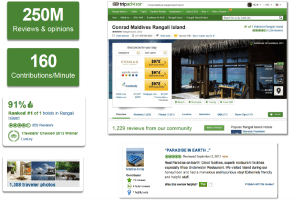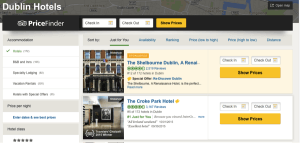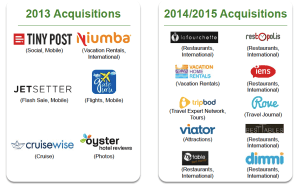TripAdvisor: A Network for Vacation Bliss

TripAdvisor has started to dominate the online vacation ecosystem with its large user base and acquisitive business model.
Creating the perfect vacation getaway? My guess is you have used TripAdvisor at some point in your travel planning process whether you are looking to determine destination, hotels to book, places to see, places to eat, etc. The vast collection of customer reviews on the site has become an extremely valuable asset for the platform’s growth and its claim to being the world’s largest travel site.
What is it?
TripAdvisor collects travelers’ reviews, photos and opinions on a variety of topics including destinations, activities, restaurants, and accommodations. This content has become a trusted source of advice for other users who are looking to create their own travel experience. Over the years, the platform has the added the functionality to compare real-time pricing for hotels, flights, etc. and to also make direct bookings. Additionally, TripAdvisor has capitalized on the move to mobile by tailoring its app to conveniently provide recommendations and booking capabilities even when you are on vacation. Essentially, TripAdvisor has become a one-stop shop for all your vacation needs.
experience. Over the years, the platform has the added the functionality to compare real-time pricing for hotels, flights, etc. and to also make direct bookings. Additionally, TripAdvisor has capitalized on the move to mobile by tailoring its app to conveniently provide recommendations and booking capabilities even when you are on vacation. Essentially, TripAdvisor has become a one-stop shop for all your vacation needs.
As of 6/30/15, the site had 250mm reviews and opinions and 375mm monthly unique users. There are localized versions of the TripAdvisor website in 45 counties and in 28 languages allowing the company to have a broad reach across the globe.
Value Cr eation
eation
The user-generated content has become a trusted source of advice for other users who are looking for travel recommendations. By building such a large database globally, TripAdvisor allows users to find relevant information even about remote areas of the world. The site has also added the ability to sort user reviews by various data points including age, type of travel, etc. to help users quickly find relevant content.
Value Capture
TripAdvisor does not charge users a fee for using its platform. Instead, the company realizes value from third party companies and online travel agencies looking to advertise their flights, hotels, and restaurants to the millions of users who frequent the site. Moreover, it allows these companies to achieve more targeted marketing based on the users’ search profile on the platform. TripAdvisor primarily generates revenue from these sources through click-based advertising, display based advertising, subscription based advertising, and direct booking commission.
 Network Effects
Network Effects
We see direct network effects on the user side of the TripAdvisor platform. Similar to other platforms, a loyal and engaged user community drives strong network effects. As you increase the number of global users on the platform, other users derive more value from the site by being able to find relevant content including reviews, recommendations, and photos.
There are indirect network effects between third party companies and TripAdvisor’s large user base. Third party companies benefit from both a broad reach and more targeted marketing. For instance, a hotel in Dublin can show ads to users who are researching anything related to Dublin on TripAdvisor. Given that TripAdvisor has grown to become the world’s largest travel site, the hotel in Dublin is likely to reach more people researching a Dublin vacation on TripAdvisor than any other site.
Creating a Closed Loop to Strengthen Network Effects
Strengthen Network Effects
TripAdvisor has acquired a number of companies in the travel and leisure space to help strengthen its network effects. The Company has acquired these smaller players either to expand its reach to markets where it lacks strength or to add new technology and capabilities. By making itself a one-stop shop for vacations, from planning to booking to actually being on the trip, it seems difficult for a new player to directly compete with TripAdvisor. A competitor can try to compete on one area such as attraction recommendations and bookings, but given that their user base won’t be as vast and strong as TripAdvisor’s, I wonder if their end goal should simply be to get acquired by TripAdvisor?



TripAdvisor has done an incredible job in creating a platform to take out the middle man and give users tons of information and reviews over everything you in need for a trip. As you say, direct network effects are clear in this platform, and even though people that posts are not travel experts, people relies in those opinions. I think this is mainly driven by the fact that professional opinion is not always the most important to you. Hearing from “real” users, gives you a different taste of how things are. TripAdvisor saw this value, and used it smartly.
Another interesting fact about TripAdvisor is that users can integrate their account with Facebook, enabling users to see reviews that their friends have posted and places and attractions that their friends have stayed at and visited. This additional layer of customization adds another factor that will increase TripAdvisor’s network effect.
The problem with this type of platform that relies on a network effect is that it can be taken advantage of. Many people can use the network and not contribute, diminishing/stagnating the quality of the product. When individuals are compelled to give feedback and user review is when they had a terrible experience or an amazing experience. This may skew the results, and diminish the quality of the offering, a core component of success. Also, the platform is used to book a trip, and feedback is given after the trip is complete – there is not a natural and easy link to give feedback without taking active effort to go out of your way to benefit others. There must be ways to improve this model.